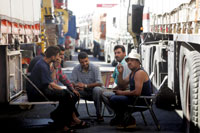 Massoud A. Derhally takes a taxi from Damascus to Beirut, in the process getting a first-hand view of real life and politics in Syria.
Massoud A. Derhally takes a taxi from Damascus to Beirut, in the process getting a first-hand view of real life and politics in Syria.
The discussion begins with Iraq and the recurring accusation by the Bush administration that Syria allowed and continues to allow insurgents to enter Iraq from its border. Syria, for its part, has vehemently denied America’s accusations and gone to pains to show it is tightening its borders. Journalists have been taken on tours in Baghouz along the border with Iraq, as a show by Damascus that it has secured the border with Iraq and put in place measures to obstruct the porous border between the two countries.
Still, Ali pulls no punches when it comes to the issue of the insurgency in Iraq. “The Americans have come for years in the Arab world in their F16s, bombed us and left and we couldn’t pass the opportunity to fight them face to face,” says Ali.
“Yes, we’ve let thousands into Iraq,” says Ali, without providing any proof.
But what of all the innocent people that have lost their lives in the endless barrage of violence and the unabated suicide attacks?
Ali shrugs and says questioningly: “Innocents? This term innocent is what they in the West tell you. Don’t believe everything they say.”
He continues, “Now when we’ve got the opportunity to fight them, you can’t come and say to a woman and her child sitting next to [former Iraqi prime minister] Ayad Allawi, who you want to behead, please move aside while I kill him.”
Chillingly and callously Ali adds: “These that are innocent, well, they go to heaven and to their God.”
He then describes how on one occasion he and several others were witnesses to a spectacular attack on an army barracks close to the Iraqi-Syrian border. “A dozen or more American soldiers walked into the barracks and then all of a sudden this car came speeding up and the entire place was blown apart. Shortly afterwards American helicopters were on the scene and we got out of there immediately,” he explains.
Syria claims it has deported or detained nothing less than 1500 foreign fighters trying to make their way into Iraq. Damascus has also said it would intensify measures on all those entering the country between the ages of 18-30 at crossing points.
On the death of former interior minister Ghazi Kanaan who is said to have committed suicide days before Detlev Mehlis, the German judge leading the investigation into the death of former Lebanese premier Rafik Hariri, released his interim report to the UN Security Council, Ali is a bit reserved in his opinion.
Ali explains there are two scenarios which he believes apply to the death of Kanaan, who ruled Lebanon for some 20 years. But before he begins, he says: “If you want to form a proper assessment of events, always pay close attention to the official announcement in the immediate aftermath.”
“President Bashar Al Assad said if there are any Syrians involved in the killing of Hariri then they will be considered as traitors,” Ali points out, adding: “Why did he wait 200 plus days to make such an announcement?”
Sensing he may have divulged a bit too much, Ali quickly reverts back to the two scenarios he believes explain Kanaan’s death.
“Kanaan was a man of courage,” he begins, “but he could not withstand the daily humiliation of the Lebanese press and media, with people like Tueni [publisher of the An Nahar newspaper] and Samir Kassir [a columnist later assassinated] attacking him.”
But then Ali adds: “Kanaan could not have killed Hariri without knowledge of senior Syrian officials and Rustom Ghazaleh took orders from him.” He insinuates that Kanaan was eliminated either because he knew too much or because he was about to divulge information.
He then repeats once again: “If you want to understand politics, simply pay attention to the announcements that immediately follow the events.”
But what of the Mehlis report?
“Kanaan is dead and Assad said if any Syrian is involved we will treat him as a traitor.”
As to the killing of Hariri, Ali pauses and then adds with a touch of conspiracy: “Well, Lebanon is a country of spies. I believe it’s the opposition in Lebanon who killed him.
“Before the tension in Lebanon I used to feel comfortable and at ease,” he sighs. “Now after everything, I avoid making nay trips there."
If anything illustrates the rising tensions it is the border crossing between Syria and Lebanon. Truckers coming to both countries have paid the brunt of the soured relations, sleeping in their vehicles for five days or more.
Ali is courageously honest when I ask him if he wants to see a democratic Syria and what changes, if any, would he like to see take place in a country that has Stalinist characteristics.
“All we want from president Assad is for him to stop the corruption and the stealing and to give more to the people,” Ali exclaims.
But then he rants and says: “To have democracy you need to study it, it requires an entirely different generation. We have been used to an archaic and corrupt system.”



